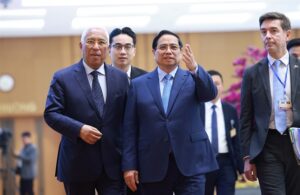China and EU Pledge Deeper Green Cooperation

Brussels, The Gulf Observer: The fifth High-Level Environment and Climate Dialogue between China and the European Union (EU) was held on Tuesday in Brussels, marking a significant step towards deepening green cooperation between the two global powers.
The dialogue was co-hosted by Chinese Vice Premier Ding Xuexiang and Executive Vice-President of the European Commission for the European Green Deal Maros Sefcovic. Vice Premier Ding, also a member of the Standing Committee of the Political Bureau of the Communist Party of China Central Committee, highlighted the frequent meetings and consensus reached between Chinese President Xi Jinping and EU leaders in recent years, which have strengthened China-EU cooperation in green transformation.
Ding underscored China’s recognition of Europe’s crucial role in a multipolar world, stating that the EU is a priority in China’s major-country diplomacy and a key partner in achieving Chinese modernization. He emphasized the need for both sides to implement the important consensus reached by their leaders, fostering more fruitful cooperation on green transformation and reinforcing stable and sound China-EU relations.
“China has firmly implemented its national strategy to address climate change, achieving remarkable results in green and low-carbon development,” Ding said. He noted that China is committed to peaking carbon dioxide emissions by 2030 and achieving carbon neutrality by 2060, integrating these goals into the broader framework of ecological civilization and economic development.
Ding highlighted the extensive common interests and broad cooperation potential between China and the EU in green transformation. He called for leveraging the high-level dialogue mechanism to seek common ground, maintain positive momentum in environmental and climate cooperation, and deepen the China-EU green partnership. He pointed to key areas for cooperation such as green energy, low-carbon technologies, plastic pollution control, and chemical environmental management.
Furthermore, Ding criticized the EU’s plan to impose additional duties on Chinese electric vehicles, labeling it as “typical protectionism” that could hinder the EU’s green transformation and global climate cooperation. He urged the EU to enhance policy consistency in environmental, climate, and economic cooperation with China, and to avoid economic and trade frictions that could delay the green transition.
“We need to resolve trade frictions through dialogue and consultation,” Ding asserted. “China is firm in its resolve to safeguard its legitimate and lawful interests.”
Maros Sefcovic acknowledged China’s pivotal influence in global affairs and emphasized the importance of maintaining good relations with China for the EU. He praised China’s strong measures and notable results in promoting green and low-carbon development and expressed the EU’s willingness to deepen cooperation with China in tackling climate change and protecting the environment. Sefcovic also emphasized the need for proper handling of differences, particularly in the development of the electric vehicle industry, through dialogue.
The dialogue also included discussions on addressing climate change and protecting the environment, reviewing the outcomes of practical cooperation since the fourth high-level dialogue, and outlining the next steps for collaboration.
Both sides committed to continuing their cooperation to ensure the success of the 29th session of the Conference of the Parties to the United Nations Framework Convention on Climate Change (COP29), thereby leading global environmental and climate governance.

